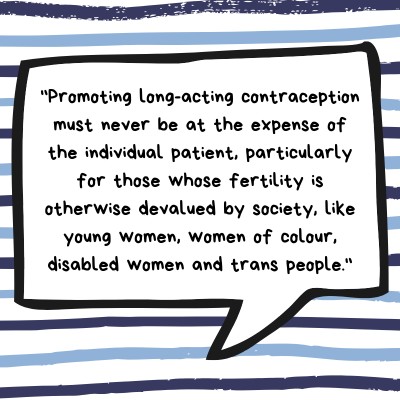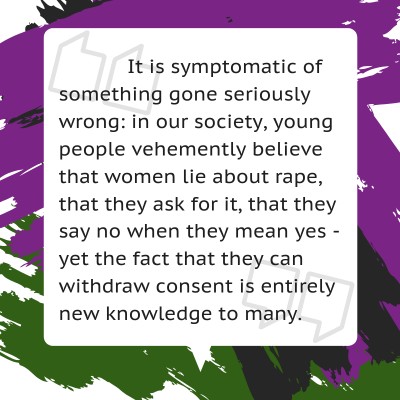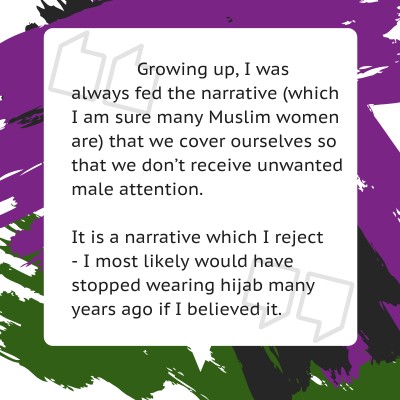Engender blog
Guest Post: Why contraception needs a Me Too moment

As discussions around schemes which offer women support on the condition they utilise long-acting reversible contraceptives (LARC) continue, we'll be hosting a series of blogs by Elspeth Wilson discussing her research into how LARC has historically been - and continues to be - used to control the fertility of marginalised people.
In this first blog, Elspeth discusses ideas around contraception and consent.
I am being told for the third time in a row that there is no possibility that the coil I have fitted could be causing any of the repeated vaginal discomfort and infections that I have been experiencing for months. I explain, again, that I previously had a coil before and that this was the only other time in my life where I had consistent infections but that, because it was my first time using a coil, I had been more easily placated when told there was no possible link. Now, faced with the same difficulties (which ironically made the point of the contraception moot in the first place due to the severe irritation) my literal lived experience of my body caused me to suspect that the coil was the cause of my woes.
GUEST POST: Notes from the classroom - Prevention work in the Highlands

Lindsay Linning is the campaigns and sexual violence prevention worker at Rape and Sexual Abuse Service Highland (RASASH). Through the national Rape Crisis prevention programme she leads workshops in senior schools in the Highlands on topics such as consent, pornography and gender. She also is coordinating the roll out of a new educational prevention resource for use with learning disabled young people called No More! and works with young feminist ambassadors in different parts of the Highlands. Here, she writes on her prevention work in the classroom.
The cards lie face up on the classroom tables and I wander the room while students in small groups confer with one another in hushed tones.
True or false? Women often lie about being raped.
True or false? If a woman is wearing revealing clothing and is raped, she’s partly to blame.
True or false? Sometimes girls say ‘no’ when they mean ‘yes’.GUEST POST: Abortion Legislation in Latin America
Belén González Leggire is an Uruguayan journalist with a master's degree in gender studies and public policy. She was born in Montevideo, and is been living in Edinburgh since 2017. The topics she has investigated over the past years have included sexual violence against women during military coups and the design of social care services in Europe and South America. She is a member of WomenBeing, a research network for the promotion of gender studies.
Here, she writes about abortion legislation in Latin America, where women can be sent to prison for illegally terminating a pregnancy or even for suffering a spontaneous miscarriage.
-400.png)
2018 was yet another year with much to think about for the feminist. In May, Ireland finally repealed the Eighth Amendment, a subsection of their 1983 Constitution that gave the equal right to life of the pregnant woman and the fetus. This cruel law has made termination illegal in the country for the last 35 years. Simultaneously, in South America, Argentina had the chance to join the small group of countries in the region which legalise abortion. Unfortunately, this did not happen. And despite the “#EleNão” (#NotHim) campaign - a social media movement of women rallying against inequality and the election of Far Right a presidential candidate - Jair Bolsonaro won the elections in Brazil, resulting in the country giving the far right more power in the region as a whole.
GUEST POST: On Faith and Feminism
-400.png)
Rose Richmond is a 21 year old graduate from Stirling University. She blogs here about finding her faith, the misconceptions facing Muslim women.
“The woman who does not require validation from anyone is the most feared individual on the planet”
Mohadesa Najumi
GUEST POST: The Unwelcome Feminist

Fai Yousaf regularly blogs over at Life of Fai and here she writes for On the Engender about her views on feminism and the hijab.
You can follow Fai on Twitter at Life_0f_Fai
“You’re destroying any progress women have made by wearing that on your head”
By that, they don’t mean the back combed hell that I attempt on occasion nor my oversized pom pom hat – both of which, it can be argued, should be banned. It is the hijab/head scarf which often evokes such strong responses from some of my female counterparts. The word hijab is more widely associated with the head covering Muslim women wear and for the purpose of this article, I’ll translate it as such. However in reality, the word encompasses a way of being, behind which is the principle of modesty and not only applies to females but men too.
Downloads
 Engender Briefing: Pension Credit Entitlement Changes
From 15 May 2019, new changes will be introduced which will require couples where one partner has reached state pension age and one has not (‘mixed age couples’) to claim universal credit (UC) instead of Pension Credit.
Engender Briefing: Pension Credit Entitlement Changes
From 15 May 2019, new changes will be introduced which will require couples where one partner has reached state pension age and one has not (‘mixed age couples’) to claim universal credit (UC) instead of Pension Credit.
 Engender Parliamentary Briefing: Condemnation of Misogyny, Racism, Harassment and Sexism
Engender welcomes this Scottish Parliament Debate on Condemnation of Misogyny, Racism, Harassment and Sexism and the opportunity to raise awareness of the ways in which women in Scotland’s inequality contributes to gender-based violence.
Engender Parliamentary Briefing: Condemnation of Misogyny, Racism, Harassment and Sexism
Engender welcomes this Scottish Parliament Debate on Condemnation of Misogyny, Racism, Harassment and Sexism and the opportunity to raise awareness of the ways in which women in Scotland’s inequality contributes to gender-based violence.
 Gender Matters in Social Security: Individual Payments of Universal Credit
A paper calling on the Scottish Government to automatically split payments of Universal Credit between couples, once this power is devolved to the Scottish Parliament.
Gender Matters in Social Security: Individual Payments of Universal Credit
A paper calling on the Scottish Government to automatically split payments of Universal Credit between couples, once this power is devolved to the Scottish Parliament.
 Gender Matters Manifesto: Twenty for 2016
This manifesto sets out measures that, with political will, can be taken over the next parliamentary term in pursuit of these goals.
Gender Matters Manifesto: Twenty for 2016
This manifesto sets out measures that, with political will, can be taken over the next parliamentary term in pursuit of these goals.
 Scottish NGO Briefing for UN Special Rapporteur on Violence Against Women
Joint briefing paper for the UN Rapporteur on Violence Against Women.
Scottish NGO Briefing for UN Special Rapporteur on Violence Against Women
Joint briefing paper for the UN Rapporteur on Violence Against Women.

Newsletter
Sign up to receive our newsletter here:
Sign up to our mailing list
Receive key feminist updates direct to your inbox: